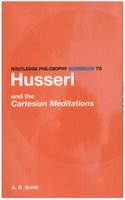Smith, A.D. - Routledge Philosophy GuideBook to Husserl and the Cartesian Meditations
 Husserl would wish to be remembered for one thing: the discovery of transcendental phenomenology as the one true path of philosophy. In fact, for many of us the unforgettable achievement of Husserl is to be found in the detailed analyses at which he toiled throughout his life - analyses of a profundity rarely seen. Husserl himself did not, however, regard many of his findings as definitive. He repeatedly speaks of how difficult it is properly to carry out detailed phenomenological work, and his manuscripts clearly testify to a constant reworking of his accounts of a range of phenomena that, to judge by his published works, one might think he had ‘settled’.
Husserl would wish to be remembered for one thing: the discovery of transcendental phenomenology as the one true path of philosophy. In fact, for many of us the unforgettable achievement of Husserl is to be found in the detailed analyses at which he toiled throughout his life - analyses of a profundity rarely seen. Husserl himself did not, however, regard many of his findings as definitive. He repeatedly speaks of how difficult it is properly to carry out detailed phenomenological work, and his manuscripts clearly testify to a constant reworking of his accounts of a range of phenomena that, to judge by his published works, one might think he had ‘settled’.




















